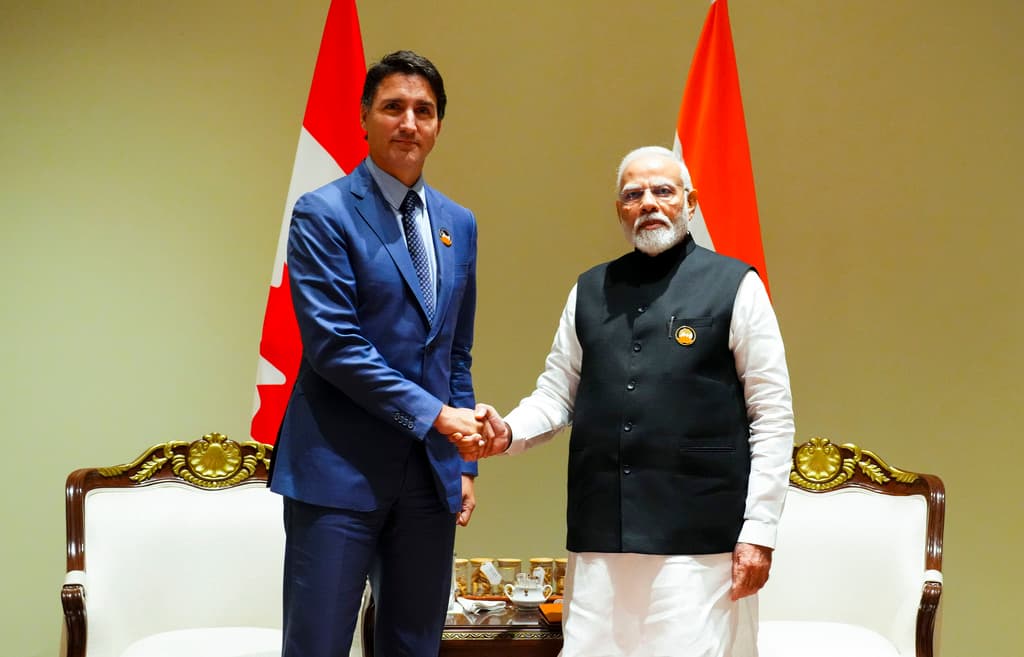Trudeau Forcing Washington To Choose Between a Cherished Neighbor and an Important Ally
Officially, the Biden administration is staying above the fray as the diplomatic skirmish intensifies between Canada and India. Behind the scenes, though, Washington hands are leaking stories that further inflame Ottawa-New Delhi tensions.

Even as Washington wishes away an Indo-Canadian diplomatic skirmish, America is being sucked into a dispute that seems to be intensifying, rather than calming down.
Officially, the Biden administration is staying above the fray. Behind the scenes, though, Washington hands are leaking stories that further inflame Ottawa-New Delhi tensions.
Canada’s prime minister, Justin Trudeau, claims he is trying to lower the flames of the fires he lit by publicly accusing Delhi of committing a political assassination on Canadian soil. Yet, Prime Minister Modi’s government on Tuesday expelled 41 of Canada’s 62 diplomats in India in retaliation.
Washington is stuck in the middle, even as India emerges as a top ally in America’s competition with Communist China. “The United States has to decide whether it will go with its Anglo-Saxon brother, or go with the big picture,” the executive editor at India’s Hindustan Times, Shishir Gupta, tells the Sun.
On Tuesday, Politico cited an unidentified Department of State official who said that the American ambassador to Delhi, Gil Garcetti, the former Los Angeles mayor, told his staff that “because of the diplomatic spat with Canada, relations between India and the U.S. could get worse for a time,” and that America “may need to reduce its contacts with Indian officials for an undefined period.”
The embassy was quick to deny. Mr. Garcetti “is working hard every day to deepen the partnership between the people and governments of the United States and India,” an unidentified embassy spokesman told Delhi reporters, adding that Mr. Garcetti and his staff are attempting “to advance the important, strategic, and consequential partnership with India.”
Returning from a September trip to India, where Mr. Trudeau attended the Group of 20 summit the Canadian premier took to the floor of parliament to claim that his national security officials have reason to believe that “agents of the Indian government” carried out the killing of a Canadian citizen.
The veracity of Mr. Trudeu’s bombshell allegation is yet to be substantiated. Since he made it, no suspected assassin has been arrested in relation to the June 18 killing of a Sikh activist, Hardeep Singh Nijjar. He was shot dead by two gunmen outside a Sikh temple at Surrey, British Columbia.
Several leak-based reports claimed that a country allied with Canada in intelligence sharing as part of a group known as the “five eyes” — which includes America, Australia, New Zealand, and Britain — was the source of Mr. Trudeau’s allegation. The New York Times went further, quoting “western allied officials” as saying it was a Washington spy agency that provided Canada with a so-called smoking gun.
The Times account, though, was sketchy, claiming that the U.S. provided the incriminating intelligence after the fact, while Canadian security officials were the ones who “intercepted communications of Indian diplomats in Canada indicating involvement in the plot.”
As in the case of the Politico leak, American officials hesitate to confirm such stories as they struggle to maintain a neutral stance. Secretary Blinken, nevertheless, called on India to cooperate with Canada in investigating the Nijjar assassination.
How could New Delhi cooperate with a Canadian investigation “when the so-called credible allegation was never shared with India?” Mr. Gupta says. He predicted that if Ottawa indeed possessed wiretaps pointing to Indian government culpability, it would decline to share them with Delhi for fear of exposing its intelligence methods.
If so, Mr. Blinken’s call for Indian-Canadian cooperation will remain hollow. Meanwhile, the Indian press is rife with reports that internal rivalries among Surrey’s Sikhs who call for independence from India was what truly led to the Nijjar assassination. The community in the Vancouver suburb is marked by a “toxic mix of Sikh politics in Canada,” Mr. Gupta writes, detailing deadly fights among Sikh separatists there.
While culpability in the June assassination is yet to be fleshed out, the politics behind Mr. Trudeau’s disclosure of unsubstantiated allegations is easier to discern, critics say. “Trudeau chose to expose intelligence following a very embarrassing trip to India,” the Foundation for Defense of Democracies’ Cleo Paskal, a Canadian who often travels to India, tells the Sun. “He hoped his disclosure would change the narrative.”
If so, Mr. Trudeau indeed changed Canada’s political focus for a while. It lasted at least until his following political stumble, when a Ukrainian Nazi war veteran was feted on the floor of Parliament, as the premier tried to highlight his friendship with President Zelensky.
Either way, as Mr. Trudeau exposed half-baked intelligence, he placed America in a delicate position, forcing Washington to pick sides between a cherished neighbor and an increasingly crucial Asian ally.
As the Politico and Times leaks indicate, some in Washington fear getting too close to Mr. Modi, who they perceive as an undemocratic Hindu nationalist. Yet, America is loath to follow Canada’s cue and lose India, which aids Western interests in Asia and beyond.

